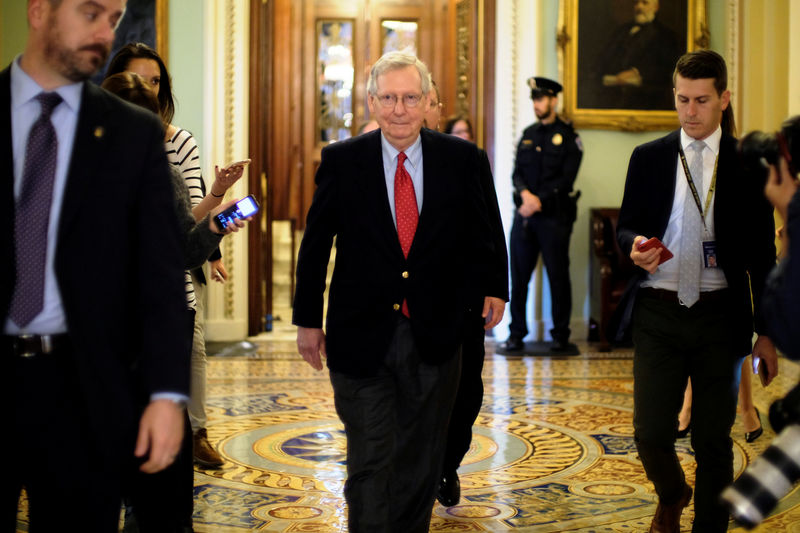 © Reuters. U.S. Senate Majority Leader Mitch McConnell (R-KY) leaves the Senate floor during debate over the Republican tax reform plan in Washington
© Reuters. U.S. Senate Majority Leader Mitch McConnell (R-KY) leaves the Senate floor during debate over the Republican tax reform plan in WashingtonBy David Morgan and Amanda Becker
WASHINGTON (Reuters) – U.S. Senate Republicans said on Friday they had enough support to pass a sweeping tax overhaul later in the day, after last-minute negotiations to ease some senators’ concerns about its impact on the federal deficit, healthcare and property taxes.
“We have the votes,” Senate Republican leader Mitch McConnell told reporters after emerging from a morning meeting with the party’s lawmakers. “Sometime today we will wrap up.”
After Republicans resumed negotiations early on Friday with the last few holdouts, Republican senators Steve Daines, Ron Johnson and Jeff Flake announced they would back the bill, as did senators James Lankford and Jerry Moran.
The support of those senators would give the Republicans at least the 50 votes needed to pass the measure. Republicans hold a 52-48 majority over Democrats in the Senate and have Vice President Mike Pence to break any tie votes.
Democrats have been united in their opposition to the bill, calling it a giveaway to the wealthy and corporations.
Lawmakers expressed confidence Senator Susan Collins would sign on as well.
Senators could move to a final vote late in the day after a potentially chaotic series of votes on amendments offered by both Republicans and Democrats.
President Donald Trump, still looking for his first major legislative accomplishment of his presidency, praised his fellow Republicans in Congress for their work in a Friday morning tweet and blamed Democrats for trying to derail the bill.
The Republican bill would make the biggest changes to the U.S. tax system since the 1980s and its success is crucial to Republican political prospects of keeping control of Congress in the November 2018 elections.
Daines and Johnson announced their support for the bill on Friday after winning more tax relief for non-corporate pass-through businesses. These include partnerships and other companies not organized as public corporations, encompassing most American business enterprises from mom-and-pop concerns to large financial and real estate organizations.
The bill now features a 23 percent tax deduction for such business owners, up from the original 17.4 percent, according to statements from both senators.
In a statement, Flake said he had secured two objectives – eliminating an $85 billion “expensing budget gimmick” in the measure and winning a commitment to work with him on fair and permanent protections for illegal immigrants who came to the United States as children.
Republicans also had been searching for a way to get Senator Bob Corker, a deficit hawk, on board. The legislation stalled late on Thursday when Senate rules prohibited adding a mechanism Corker had sought to trigger tax increases in coming years if the bill fails to boost the economy enough to generate sufficient revenues to pay for tax cuts.
On Thursday, the nonpartisan Joint Committee on Taxation released a report saying the legislation would add $1 trillion to the deficit in the next 10 years, even with tax-driven economic growth projections factored in.
“Ideally we’d like to get everybody we can,” Senator John Thune told reporters, adding he would like to see “a trigger mechanism that works.”
Collins had pushed for concessions to minimize the impact on older and sicker Americans of a provision of the bill that would repeal part of the Obamacare health law. Some senators also want to change the Senate bill so that state and local property taxes are deductible up to $10,000, which would mirror legislation already passed by the House of Representatives. As drafted, the Senate bill ends deductibility of state and local taxes entirely.
Senators were aiming to pass a bill this week and then agree later this month to final legislation with the House of Representatives, which their party also controls.
Source: Investing.com





























